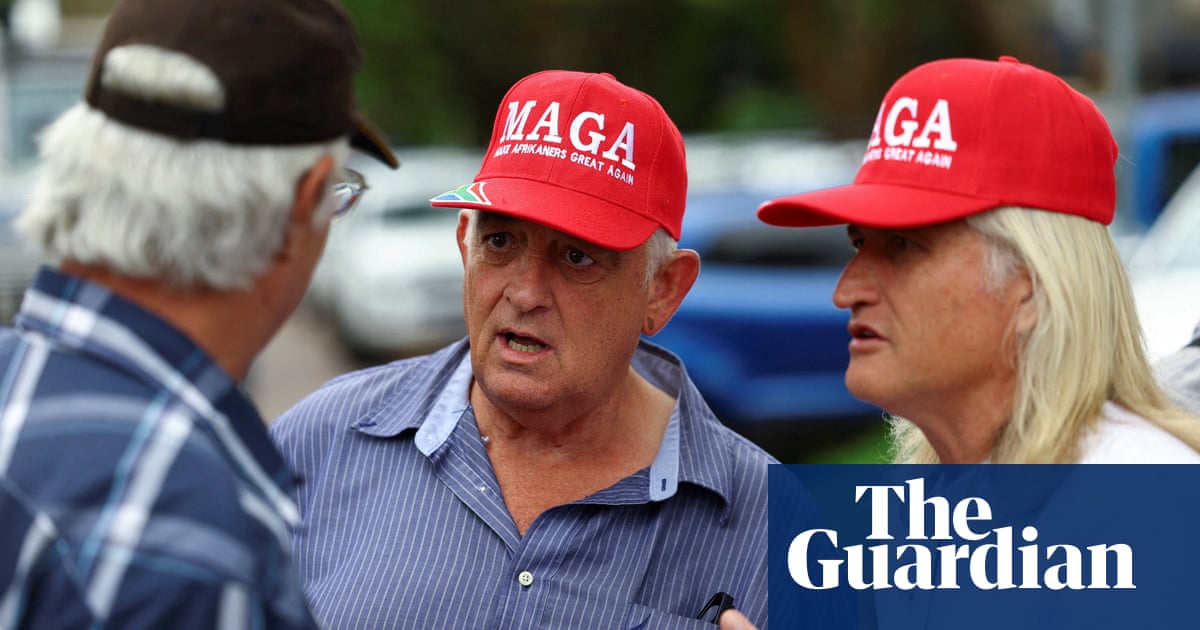Kyle believed God was looking out for him when he survived a violent farm robbery inSouth Africaeight years ago with only a black eye and broken ribs. The robbers failed to get the kettle and iron working, so were unable to burn anyone. Then the gun trigger jammed when they tried to shoot Kyle in the spine.
“They specifically said they were coming back for this farm … [that] it was their land,” said the 43-year-old, who did not want to use his full name. “Only afterwards, we found out that the guy that stays on the plot was actually killed … the farmhand … I don’t know what his name was.”
Kyle, a divorced father of three, is one of thousands of white South Africans hoping to take up Donald Trump’soffer of refugee status, to escape crime and what they allege is discrimination against white people.
The Trump administration’ssupport for these claims, whilestopping other new refugee arrivals, has inflamed uncomfortable conversations about how far racial reconciliation still has to go, three decades after the end of white minority rule.
The US president’s offer was a “godsend”, said Kyle, now a salesman working remotely for an overseas company: “I’ve got white children, they’re at the bottom of the hiring list here. So, there is no future for them. And the sad thing is they don’t even know what apartheid is.”
White Afrikaner governments racially segregated every aspect of life from relationships to where people were allowed to live during apartheid, repressing South Africa’s Black majority while keeping the white minority safe and much better off.
South Africa remains deeply unequal, more than 30 years since the system ended. The black South Africanunemployment rate is 46.1%, for example, compared with 9.2% for white people.
Affirmative action has created a Black elite, but also nurtured feelings of disfranchisement among some white South Africans. Less than two-thirds of white South Africans agreed that apartheid deprived black people of their livelihoods, v three-quarters of Black South Africans, according to the2023 Reconciliation Barometer, a survey by the Institute for Justice and Reconciliation, a thinktank.
Kate Lefko-Everett, the report’s author, said: “The level of contact and interaction between South Africans of different race groups has not really changed substantially.”
South Africa’s high violent crime rate – in the last quarter of 2024 there were almost 7,000 murders, according topolice figures– affects everyone. But it has also added to a siege mentality among some white people. Almost two-thirds of white people were considering emigrating, compared with 27% of all South Africans, according to 2022 Afrobarometer data.
More than 8,200 people have registered their interest in US refugee status, the New York Timesreportedin March. The US embassy in Pretoria refused to comment.
Chilly Chomse, a 43-year-old carpenter, said he wanted to claim asylum for the sake of his four daughters.
He moved to Orania, awhite, Afrikaner-only town, for work during the Covid-19 pandemic, but said he was not committed like some residents: “Once you leave this Orania premises, you are still in South Africa … you’re not safe and you can’t remain here 24/7 for the rest of your life.”
While some white English-speaking South Africans like Kyle hope the refugee programme will include them too, Trump’s February executiveorderreferred to “ethnic minority Afrikaners”. It claimed a recently signed South African law that allows land expropriation in limited circumstances would enable the government to seize Afrikaners’ property, while state policy was “fuelling disproportionate violence against racially disfavoured landowners” (a longstandingfar-right claim).
When Esté Richter, a friend of Chomse’s in Orania, heard about Trump’s refugee policy, she initially did not believe it. “Then I felt that someone has heard us, finally, that someone has heard the cries of Afrikaners,” said Richter, 35, who homeschools her two children and helps her husband with plumbing jobs.
“The main reason why we are looking at the refugee programme is in September 2022 my husband’s father was murdered on his farm,” she said. Richter’s mother-in-law was burned with a hot iron, beaten up and abandoned in the bush, but survived.
TheAfrikaner rights group AfriForummet Trump allies in the US during his first term,claimingthe South African government was “complicit” in white farmer murders. The group, which has 300,000 members, continues toclaimthat “Afrikaners are the target”.
Rudolph Zinn, a University of Limpopo professor, noted South African police data onfarm attacks– whichlisted12 “farming community” murders in the final quarter of 2024 – included black smallholder farms and non-commercial plots.
He said: “It’s definitely not linked to any political motive or a specific race. It’s all about the money.”
Zinn said imprisoned farm robbers he interviewed said they would tailor their language to instil as much fear as possible to get victims to hand over cash and valuables. “If it’s a white victim, then they would say: ‘I hate you because you’ve taken our land.’ But the very same offender would, when it’s a Black victim, say: ‘You’re a coconut, black on the outside, but inside you’re white.’”
Both AfriForum, which promotes staying in South Africa, and the prospective refugees raised the controversialKill the Boersong as a reason for their fears. A South African court ruled in 2022 that the song, sung by the populist, far-left Economic Freedom Fighters party at political rallies, was not meant literally.
Others said South Africa risked a “white genocide”, a conspiratorial claim repeated by Trump’sbillionaire, South African-born adviser Elon Musk.
Sam Busa, a 60-year-old business consultant of British descent, wants to claim asylum for herself and her three adult sons. She set up an “Amerikaners”websiteand social media pages to disseminate information, and gathered 30,000 signaturesto thank Trumpfor offering refugee status.
She said: “We’re in, in my personal opinion, an advanced stage of a genocide potentially unfolding. What that does is it effectively throws out any argument about economic status.”
